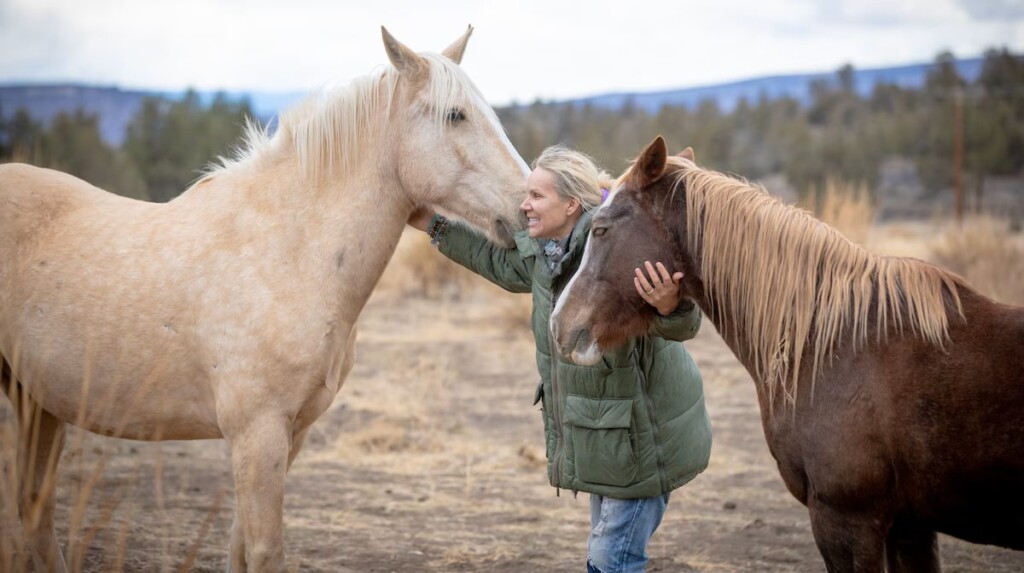She Rescues Wild Mustangs That Are Rounded-Up and Reunites Their Herds on Her Ranch

A former Hollywood producer turned rancher is rescuing mustangs and wild donkeys from being sold at auction to potentially abusive environments or slaughterhouses.
Clare Staples is her name, and when she first became aware that the West’s wild mustangs are rounded up by the Bureau of Land Management and sold at auction, she realized this meant that horse families were being separated against their will.
Already having passed 50 and looking for a purpose-driven mission in her life, she founded Skydog Ranch and Sanctuary intending to provide 9,000 acres of grazing land where mustangs and wild donkeys, called burros, can roam in familial peace for the rest of their days.
In media interviews, Staples has likened the work to that of the detective. Horses across 10 western states are gathered in the annual “round-up”—a vast capture operation of wild horses and burros to keep their numbers down. Often this means a mare and her foal living in Arizona might be separated, with the foal sold in Oregon, and the mare sold in Nevada, or something similar.
Staples uses a network of photographers to track members of families, and even herds, and use the money made through their nonprofit operations to buy them at BLM auctions to the end that they’re reunited at her ranch.
“It’s kind of like being a wild horse detective. We rely on the photographers who go out into the wild,” Staples told KOIN 6 News. “There are certain herds, especially in Oregon, where people name horses and they become well known on these Facebook pages.”
The round-up has been going on for decades and inspires controversy in every state where it takes place. Proponents of the round-up say that wild mustangs and burros are non-native, invasive species that negatively alter the landscape for sensitive, native species. Opponents argue that the origins of the round-up come from ranching interests, whose herds of cattle—which far outnumber the populations of wild mustangs and burros—compete with these animals for grazing space.
It’s true that the ancestors of horses went extinct on the North American continent tens of thousands of years ago, and that the current post-glacial ecosystems never evolved with their presence. It’s also true that in many states there are no predators to keep their numbers under control, and so the round-up simulates the predation rate of an ecosystem where predators would be hunting them.
WILD HORSES AROUND THE WORLD: Wild Horses Return to Kazakhstan Plains After Two Centuries of Absence
Yet it’s also true that the presence of ranched cattle on the same BLM land where mustangs and burrows live is orders of magnitude greater and more disruptive than that of the equines.
As she would like to see it
Taking matters into her own hands rather than relying on the government, Staples created a little slice of the West as she would like to see it—dotted with herds of these charismatic beasts who are able to live in peace.
So far, Staples has welcomed around 260 mustangs and 60 burrows onto her property, many of which took months of detective work to identify.
HORSE HEROES: Willie Nelson Has Rescued 70 Horses Destined for the Slaughterhouse, So They Can Roam Free On His Farm
“If you’re looking for a horse with a tiny white patch over its left eye, Clare will do everything she can to find that horse using photographic documentation,” said Scott Wilson, a photographer whose work allows Staples to track down members of horse herds that were separated during the round-up.
Though she firmly opposes the round-up, she sometimes relies on the BLM employees to point her in the direction of paired horses, like the mother and daughter in the video below.
“They were rounded up from Green Mountain Wyoming, and it was the corrals at Rock Springs who asked us to take them as they noticed how bonded and wild they were and didn’t want them separated,” the organization explains.
“Wild horses have such deep bonds,” Staples told the Washington Post. “Who are we as humans to think we’re the only species that cares about their family?”
SHARE This Beautiful, Inspiring Mission And The Dedicated Woman Leading It…
>read more at © GoodNews
Views: 2